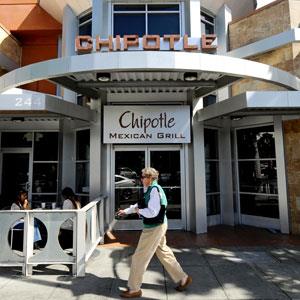Posted On: 10/27/2013 11:51:22 PM
Post# of 99599

Wow look at this one,Just good reading!

 By Adam Fischbaum
By Adam Fischbaum
Polyester-draped family photos aside, being a child of the 1970s was pretty cool in some ways. There were many things to dislike -- bad hair, bad clothes and a lot of terrible music -- but the TV shows weren't too bad.
For several years in the mid-'70s, my family used to sit down faithfully on Tuesday nights in front of our ridiculous console TV set to watch "Happy Days." The series ran well into the '80s, but most viewers gave up on it after the famous episode in which the Fonz jumped a shark while waterskiing. The series went downhill fast after that, giving rise to the awesome phrase "jumped the shark," which is used to describe when something has peaked and rolled over.
Stocks, of course, are highly capable of jumping the shark.
Let me be upfront. I've never been to a Chipotle Mexican Grill ( CMG +0.87% ) -- but being in the investing biz, I'm familiar with the brand, thanks to the financial media's nonstop gushing about the company and its stock. Clearly, Chipotle is a bona fide rock star.
 A double in two years is impressive, but these numbers are unsustainable. I don't care how good the food or the business model is.
A double in two years is impressive, but these numbers are unsustainable. I don't care how good the food or the business model is.
What's in those burritos?
American diners are loco for Chipotle, a pioneer in the convenient-casual dining space. Convenient-casual is described as a having a little higher quality than fast food but at about a 20% cost savings to traditional casual dining such as Red Lobster or Olive Garden, brands owned by Darden Restaurants ( DRI +0.41% ). And the concept has worked like crazy, driving three consecutive years of 9%-plus same-store sales growth. The company now boasts nearly 1,500 units.
But this growth just isn't sustainable. The numbers are super-rich here. Chipotle sports a $500-plus stock price, a trailing price-to-earnings (P/E) ratio of 52 and a forward P/E of 49. That means investors are willing to pay around $50 for one dollar's worth of Chipotle's current earnings. That's confidence -- and historically, valuations that lofty just aren't realistically sustainable. (Anyone remember the tech bubble?)
Let's look at Chipotle's growth plan. The company has opened 129 new stores this year, 37 in the third quarter. That's a big expansion, and despite the company's focus on smaller stores, which are more cost-effective to open and operate, if you've seen a Chipotle -- with their modern designs and expensive-looking fixtures -- you know they're not done on the cheap.
Chipotle's growth strategy brings back memories of a similar push by Starbucks ( SBUX +1.15% ) early in the past decade. Starbucks' stores were high-tech, expensively appointed -- and everywhere. Between 2006 and 2009, the company closed 600 stores due to overreaching and oversaturation.
Starbucks' folly had a noticeable impact on earnings growth, which, naturally, had a negative impact on the stock price. Shares of SBUX fell more than 30% in 2007. Chipotle's growth strategy could have the same chilling effect on its euphoric stock price.
Chipotle has also earned brand loyalty by focusing on fresh, high-quality ingredients, especially non-genetically modified (GMO) produce. That's all well and good -- but if you've ever shopped in the organic section of your local supermarket, you may have noticed a big price difference. Multiply that on a wholesale level across Chipotle's nearly 1,500 stores. A bump in input cost on Chipotle's end will be passed immediately to consumers. The average ticket for a family of four at Chipotle is already north of $30; how much more would customers pay for fancy fast food, especially in a fragile economy? A price hike of 10% to 15% would definitely slow down traffic.
Hedge fund funny business
One other factor that could contribute to a Chipotle correction could be a last-ditch play by underperforming hedge fund managers. With roughly two months left in 2013, and hedge fund returns averaging 3.4% compared with the S&P 500 Index's 20%-plus, managers are looking for a profitable trade. A stock that has been bid up 80% this year is a prime short candidate. Any hint of bad news will sound the charge for the shorts. Any investors wanting to take year-end profits should see this as an ideal opportunity to pile on.
From a technical standpoint, the stock is putting in the second shoulder of a textbook double top.
 That usually spells trouble. After a parabolic run this month, the stock price will most likely take a breather. However, if the fundamentals of the company deteriorate as well, the technical picture will deteriorate exponentially. Shares could fall 50% over a two-year period from their current $500-plus level to around $250 -- which still might be too expensive.
That usually spells trouble. After a parabolic run this month, the stock price will most likely take a breather. However, if the fundamentals of the company deteriorate as well, the technical picture will deteriorate exponentially. Shares could fall 50% over a two-year period from their current $500-plus level to around $250 -- which still might be too expensive.
Risks to consider: Whenever taking the bearish side of any investment thesis, there's a chance you could be wrong. Do NOT short stocks if you have no experience doing so. One way to play the decline in a stock price is to own put options . My thesis is based on what I see as investor overoptimism. Remember the old John Maynard Keynes axiom: "The market can stay irrational longer than you can remain solvent."
Action to take: Investors long shares of Chipotle should take profits if possible. Stop-loss orders are highly recommended. Call options are also a great way to hedge positions and generate income. Those considering buying should avoid purchasing. If you are looking for exposure to the restaurant sector, Darden Restaurants makes more sense at around $51 per share with a forward P/E of 17 and a 4.3% dividend yield.
This high-flying stock could tumble 50%
After a spectacular run, it's time to take profits in Chipotle Mexican Grill. Here's why.
By StreetAuthority Fri 4:00 PM

 By Adam Fischbaum
By Adam Fischbaum Polyester-draped family photos aside, being a child of the 1970s was pretty cool in some ways. There were many things to dislike -- bad hair, bad clothes and a lot of terrible music -- but the TV shows weren't too bad.
For several years in the mid-'70s, my family used to sit down faithfully on Tuesday nights in front of our ridiculous console TV set to watch "Happy Days." The series ran well into the '80s, but most viewers gave up on it after the famous episode in which the Fonz jumped a shark while waterskiing. The series went downhill fast after that, giving rise to the awesome phrase "jumped the shark," which is used to describe when something has peaked and rolled over.
Stocks, of course, are highly capable of jumping the shark.
Let me be upfront. I've never been to a Chipotle Mexican Grill ( CMG +0.87% ) -- but being in the investing biz, I'm familiar with the brand, thanks to the financial media's nonstop gushing about the company and its stock. Clearly, Chipotle is a bona fide rock star.
 A double in two years is impressive, but these numbers are unsustainable. I don't care how good the food or the business model is.
A double in two years is impressive, but these numbers are unsustainable. I don't care how good the food or the business model is. What's in those burritos?
American diners are loco for Chipotle, a pioneer in the convenient-casual dining space. Convenient-casual is described as a having a little higher quality than fast food but at about a 20% cost savings to traditional casual dining such as Red Lobster or Olive Garden, brands owned by Darden Restaurants ( DRI +0.41% ). And the concept has worked like crazy, driving three consecutive years of 9%-plus same-store sales growth. The company now boasts nearly 1,500 units.
But this growth just isn't sustainable. The numbers are super-rich here. Chipotle sports a $500-plus stock price, a trailing price-to-earnings (P/E) ratio of 52 and a forward P/E of 49. That means investors are willing to pay around $50 for one dollar's worth of Chipotle's current earnings. That's confidence -- and historically, valuations that lofty just aren't realistically sustainable. (Anyone remember the tech bubble?)
Let's look at Chipotle's growth plan. The company has opened 129 new stores this year, 37 in the third quarter. That's a big expansion, and despite the company's focus on smaller stores, which are more cost-effective to open and operate, if you've seen a Chipotle -- with their modern designs and expensive-looking fixtures -- you know they're not done on the cheap.
Chipotle's growth strategy brings back memories of a similar push by Starbucks ( SBUX +1.15% ) early in the past decade. Starbucks' stores were high-tech, expensively appointed -- and everywhere. Between 2006 and 2009, the company closed 600 stores due to overreaching and oversaturation.
Starbucks' folly had a noticeable impact on earnings growth, which, naturally, had a negative impact on the stock price. Shares of SBUX fell more than 30% in 2007. Chipotle's growth strategy could have the same chilling effect on its euphoric stock price.
Chipotle has also earned brand loyalty by focusing on fresh, high-quality ingredients, especially non-genetically modified (GMO) produce. That's all well and good -- but if you've ever shopped in the organic section of your local supermarket, you may have noticed a big price difference. Multiply that on a wholesale level across Chipotle's nearly 1,500 stores. A bump in input cost on Chipotle's end will be passed immediately to consumers. The average ticket for a family of four at Chipotle is already north of $30; how much more would customers pay for fancy fast food, especially in a fragile economy? A price hike of 10% to 15% would definitely slow down traffic.
Hedge fund funny business
One other factor that could contribute to a Chipotle correction could be a last-ditch play by underperforming hedge fund managers. With roughly two months left in 2013, and hedge fund returns averaging 3.4% compared with the S&P 500 Index's 20%-plus, managers are looking for a profitable trade. A stock that has been bid up 80% this year is a prime short candidate. Any hint of bad news will sound the charge for the shorts. Any investors wanting to take year-end profits should see this as an ideal opportunity to pile on.
From a technical standpoint, the stock is putting in the second shoulder of a textbook double top.
 That usually spells trouble. After a parabolic run this month, the stock price will most likely take a breather. However, if the fundamentals of the company deteriorate as well, the technical picture will deteriorate exponentially. Shares could fall 50% over a two-year period from their current $500-plus level to around $250 -- which still might be too expensive.
That usually spells trouble. After a parabolic run this month, the stock price will most likely take a breather. However, if the fundamentals of the company deteriorate as well, the technical picture will deteriorate exponentially. Shares could fall 50% over a two-year period from their current $500-plus level to around $250 -- which still might be too expensive. Risks to consider: Whenever taking the bearish side of any investment thesis, there's a chance you could be wrong. Do NOT short stocks if you have no experience doing so. One way to play the decline in a stock price is to own put options . My thesis is based on what I see as investor overoptimism. Remember the old John Maynard Keynes axiom: "The market can stay irrational longer than you can remain solvent."
Action to take: Investors long shares of Chipotle should take profits if possible. Stop-loss orders are highly recommended. Call options are also a great way to hedge positions and generate income. Those considering buying should avoid purchasing. If you are looking for exposure to the restaurant sector, Darden Restaurants makes more sense at around $51 per share with a forward P/E of 17 and a 4.3% dividend yield.
Adam Fischbaum does not personally hold positions in any securities mentioned in this article.
StreetAuthority LLC owns shares of SBUX in one or more of its “real money” portfolios.
StreetAuthority LLC owns shares of SBUX in one or more of its “real money” portfolios.
I'm in it to win it!
NASDAQ DIP and RIP
Here is the best word that describes what i do here.
Intuitive;
means having the ability to understand or know something without any direct evidence or reasoning process.
I was born with it, I'm truly blessed!
Alway's searching for winners'

NASDAQ DIP and RIP
Here is the best word that describes what i do here.
Intuitive;
means having the ability to understand or know something without any direct evidence or reasoning process.
I was born with it, I'm truly blessed!
Alway's searching for winners'

